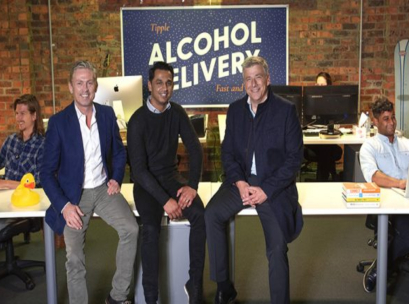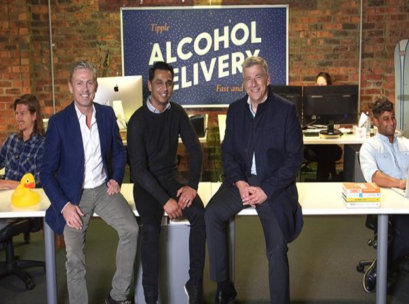 Earlier this week, 7-Eleven announced that it was acquiring a majority stake in Tipple, an on-demand alcohol delivery startup that aims to do for alcohol what Deliveroo and UberEats do for food. The partnership is focused on growing Tipple as a standalone business.
Earlier this week, 7-Eleven announced that it was acquiring a majority stake in Tipple, an on-demand alcohol delivery startup that aims to do for alcohol what Deliveroo and UberEats do for food. The partnership is focused on growing Tipple as a standalone business.
“7-Eleven [lead] the way in digital innovation… and continue to explore how we can best meet the evolving needs of our convenience customers through digital, delivery and in-store services,” 7-Eleven CEO Angus McKay said in a statement.
“Tipple’s business model and platform is well aligned with these interests, and has grown significantly since starting up less than three years ago.”
While the majority of customers still shop for booze in person, there are scenarios where a trip to the bottle shop is inconvenient, and online services such as Tipple aim to capitalise on these opportunities.
This year, the Melbourne-based company has expanded on a national scale to provide 30-minute alcohol delivery in zones around the country.
“You can throw a stone these days and likely hit three bottle shops – they’re everywhere and typically open late,” Tipple founder and CEO Ryan Barrington tells IRW.
“So when the same offering in-store is simply being replicated online by the big chains, there’s not much of an incentive for consumers to switch to online shopping like there might be in other verticals.”
Indeed, new research shows that a healthy 93 per cent of purchases involving alcohol are being made in-store in person. In its Insight on Alcohol Consumers in Australia report released last week, Field Agent took a deep dive into the demographics and buying behaviour of the Australian public.
Based on a sample size of 1000 participants, split evenly between men and women of legal drinking age, the report found that 69 per cent of those surveyed said they drink alcohol “at least once a month”.
In a smaller survey of 39 people about on-demand and same-day alcohol delivery, Field Agent found that 16 per cent had tried click-and-collect and only 2.2 per cent had ordered alcohol through an “on-demand” service such as UberEats or Tipple.
Despite these statistics, when queried about the likelihood of purchasing alcohol for same-day delivery within the next six months, 62 per cent were open to the possibility.
The top driver for purchases in this category was a convenient location, with 59 per cent of respondents rating it more important than price (38 per cent), a good range (16 per cent) and far ahead of the lowest driver: service.
If convenience is the most important, and service is the least, why isn’t online alcohol delivery taking off?
“While alcohol delivery is not a new thing, uptake has been slower than in the food delivery segment,” IBISWorld senior industry analyst James Thomson tells IRW.
“Online liquor sales have grown at an annualised 11.1 per cent over the past five years to reach $450 million. This compares with the overall liquor retailing market, which has grown at an annualised 2.4 per cent over the past five years.”
Thomson explains that while bricks-and-mortar retail still dominates in this field, and that the slower shift is likely a result of customers commonly purchasing alcohol on the way to an event, sales through on-demand liquor delivery services are likely to grow strongly over the next five years.
“Another trend we have been seeing across the broader alcoholic beverages sector is growth in sales from small and boutique producers, rising sales from vineyard cellar doors and boutique breweries and distilleries.
“Australian drinkers have become more interested in the origin and story behind the alcoholic beverages they are purchasing, and have embraced the experience of visiting the production locations and meeting the producers.
“Again, this slows online growth compared with some other retail sectors.”
This is a similar story to trends in the food and grocery industries, with customers becoming more and more aware of where food is coming from and how it is being manufactured.
The biggest online drinks retailer in Australia
A few months ago Roy Morgan revealed that over half of the total amount spent on alcohol goes through the Woolworths-owned Endeavour Drinks Group, which includes Dan Murphy’s and BWS, and which recently launched Endeavour Marketplace, an online marketplace.
Touted as an evolution of Dan Murphy’s Connections – the group’s effort to connect wineries, distilleries and craft breweries with customers – Endeavour Marketplace promises to be the “biggest online drinks retailer in Australia”, allowing suppliers to list product on its site through a drop-ship model.
“We know an inspiring and locally relevant range is increasingly important to our customers,” Claire Smith, Endeavour Drinks’ general manager of customer connections, said in a statement.
“Endeavour Marketplace allows us to work with suppliers to expand the range of products we offer our customers beyond what we can offer on shelf in stores. It’s been designed from the ground up with simplicity, ease of navigation and customer focus in mind.”
Some fear that such ease of access to alcoholic products could lead to heavier drinking, though Thomson isn’t convinced this will become an issue.
“Per capita alcohol consumption has been on the decline for the past decade in part due to rising health consciousness, and we expect this to continue into the future,” he explains.
“While delivery apps like Tipple make alcohol more accessible, we see any change in Australia’s drinking culture likely to be more dependent on attitude rather than accessibility.”
And despite the relatively low demand so far, Tipple’s Barrington believes having more players in the market can only be for the best, as it will grow the category and offer more obscure and specialty products greater visibility online.






